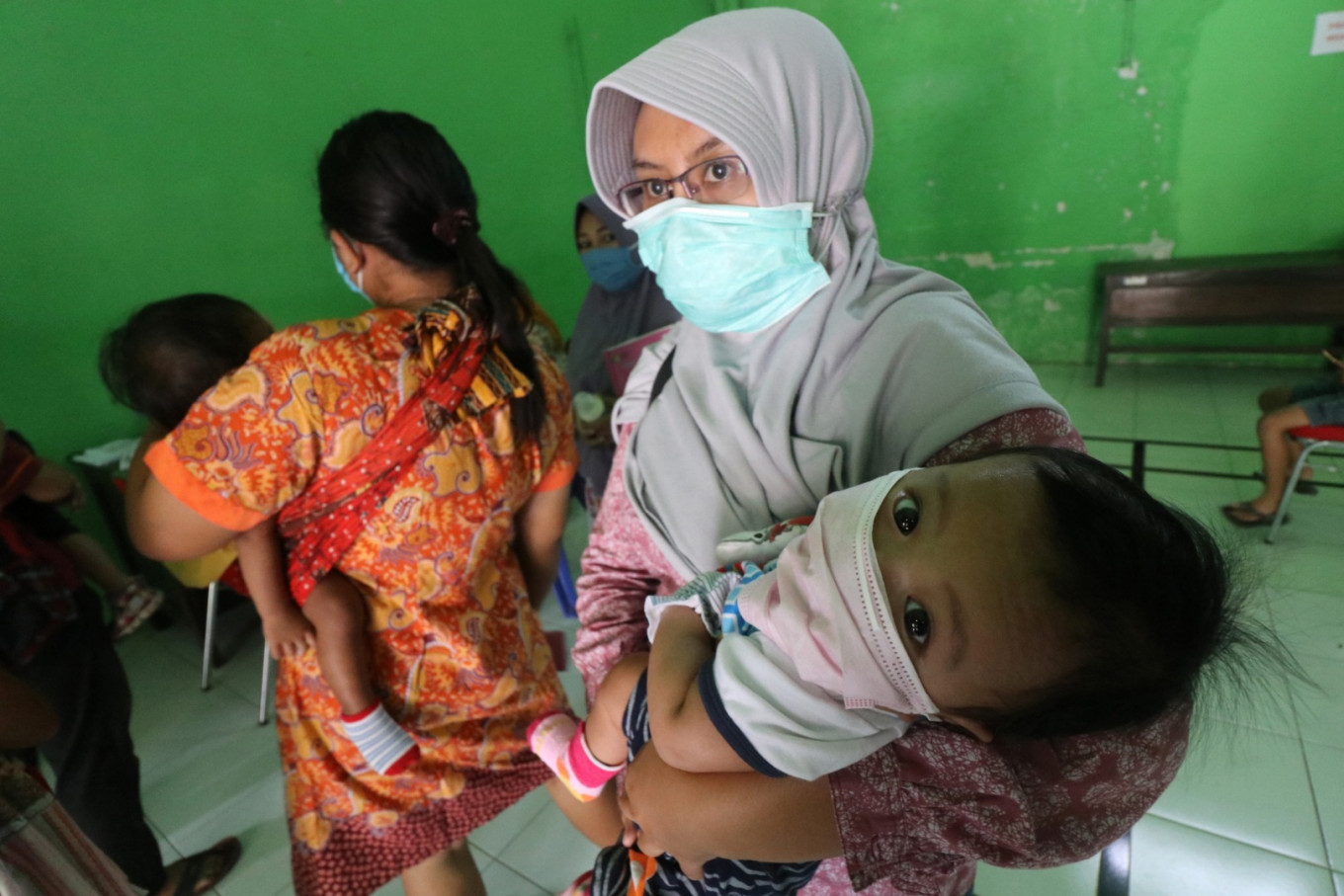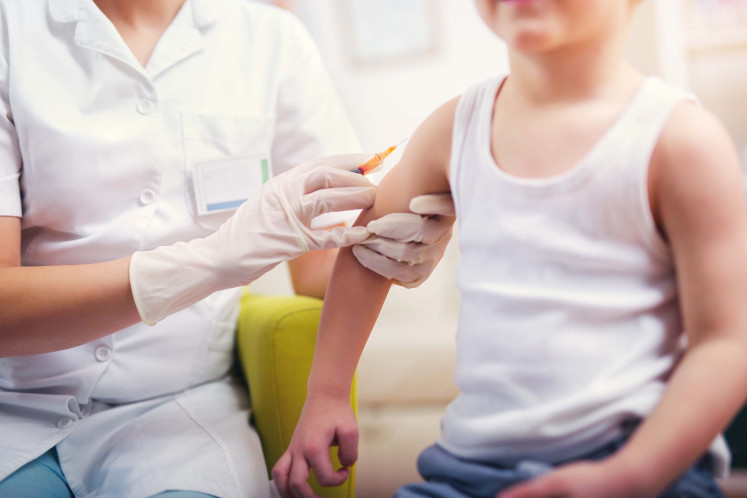Vaccination during COVID-19: Parents left to make ‘best’ decision
Change Size

M
ost parents want to do their best for their children, including getting them vaccinated so they have immunity against preventable diseases that could lead to developmental disorders and permanent disabilities, even death.
Doing their best with regard to childhood immunization, however, poses a dilemma during the COVID-19 pandemic. On the one hand, they fear that their children may be exposed to the coronavirus; on the other hand, their children will be susceptible to infectious diseases such as measles, diphtheria and polio unless they take them to a health center for their vaccines.
Marcelina Felix, a 27-year-old housewife who lives in Yogyakarta and gave birth during the pandemic, says that she and her husband are deeply worried about the possibility of their newborn being exposed to disease – just like many other parents.
“However, this feeling of worry is far smaller than our conviction that getting our infant vaccinated is far more important for her health,” Marcelina told The Jakarta Post.
Notwithstanding the COVID-19 pandemic, she and her husband are trying their best to get their 7-week-old daughter vaccinated according to the immunization schedule, so that she “has higher level of immunity.”
She says that their infant daughter got her first round of vaccines on the day she was born at Panti Rapih Hospital. Following her hepatitis vaccine, she got her BCG vaccine against tuberculosis (TB) when she was 4 weeks old. Their daughter will also be vaccinated against other childhood illnesses, including polio, says Marcelina.
“Our daughter was born amid the pandemic and so we have to adhere to the health protocols, such as wearing masks, maintaining physical distance, and hand washing,” she adds.
“The clear thing is that now, everyone must first pass the health screening every time they enter the hospital, and [those] accompanying the child are limited to two people (the father and the mother).”
Marcelina acknowledges that the close relatives like the child’s grandparents often worry excessively. “They fear that we, the child’s parents, as well as the child, might contract [COVID-19] while visiting the hospital,” she says.

Ria is also haunted by the fear of possible exposure to the coronavirus, which has prompted her to make the best decision she can: delay getting her child vaccinated.
“According to the [immunization] schedule, my 11-month-old child should have one more vaccine during the pandemic. I have delayed it because I see the situation and condition. Hospitals, puskesmas [community health centers] and other recommended health facilities are focused on managing [COVID-19] and so I think it is better to delay,” said the 45-year-old woman, who also lives in Yogyakarta.
Ria said that Yogyakarta had extended its emergency restrictions to July 31, so “by the end of this month, I hope I am ‘brave’ enough to take my baby to the immunization service”.
“All people, including me, certainly hope that the COVID-19 outbreak will soon [subside] from earth,” she told the Post.
“Like many others, I also expect that the situation and condition in the ‘new normal’ era will be like before the COVID-19 pandemic. Who would be unwilling to do activities like [they did] before? We can go anywhere freely,” said Ria. “I am a housewife who runs a small business and need to meet my customers. But now, I have to stay alert and be careful and won’t be able to conduct activities like I used to once the new normal starts. I have to look at the situation and condition.”
Meanwhile, Dani, 28, who is the mother of a young child, told the Post that she might have been equally worried if her child had not been vaccinated. “I feel extremely relieved that my daughter got her complete vaccinations before the pandemic,” said Dani, who works at a private insurance company in Jakarta.
She said that her daughter got her vaccinations from the midwife who helped in her birth. ”[The midwife] also prepared the immunization certificate for my daughter,” said Dani.
The parents’ concerns are reasonable and understandable, as they don’t want put their children at risk of COVID-19 infection.
Double outbreak
Pediatric cases of COVID-19 transmission and death have been confirmed in Indonesia, with the Indonesian Pediatric Society (IDAI) revealing on June 26 that 1,543 children had tested positive for COVID-19 since the country announced its first two cases on March 2. Of these cases, 36 children had died from the disease.
The IDAI earlier backed a report that the pandemic had hampered the national immunization program, as many parents were afraid to take their children to health facilities that offered vaccination services, such as puskesmas and posyandu (integrated health post).
In addition, a decline had been recorded in the vaccination services offered at puskesmas and posyandu. A survey conducted in collaboration with the Health Ministry’s Surveillance and Health Quarantine Directorate General, UNICEF and pediatricians in April – just one month after the emergence of COVID-19 was confirmed in Indonesia – revealed that the outbreak had affected 83.9 percent of the services provided by puskesmas, posyandu and other health facilities across all provinces and regencies. In particular, the vaccination service had declined 4.7 percent in coverage compared to the corresponding period last year.
IDAI spokesman Hartono Gunardi expressed concern about the situation, which could leave children under 5 years of age potentially susceptible to diseases that could be prevented by the vaccines offered under the immunization program.
He also warned that the situation could potentially lead to a double outbreak: “We have the COVID-19 epidemic [and] also face another outbreak of diseases that could actually be prevented by children having access to the vaccines.”
COVID-19 government spokesman Achmad “Yuri” Yurianto, who is secretary to the Disease Control and Prevention Director General, expressed a similar concern earlier.
The childhood immunization program should continue regardless of the COVID-19 health crisis, he said, because infants, toddlers and adolescents had the right to protection from various diseases through vaccination.
“They are the hope of the nation,” said Yuri.
The old way of visiting posyandu in person to receive counseling and general checkups needs to be replaced by a new, more relevant method.
And while many puskesmas and posyandu had seen a decline in their vaccination services, clinics have seen a surge in demand.
Suzana Clinic in Singkawang, West Kalimantan, for example, recorded an increase in vaccination demand of between 20 percent and 30 percent, because the posyandu in the subdistrict has been temporarily closed during the health crisis.
“Before the pandemic, we served between 30 and 35 children per day, but now, since the pandemic, we are serving between 50 and 60 children per day,” founder and midwife Suzana told the Post.
“We adhere to the health protocols in [running the clinic] and if we find a mother showing cough and flu symptoms, we advise her to first see a doctor at a puskesmas and then come back with her child once she has recovered,” she said.
Without a vaccination protocol in place during the epidemic, it seems that the final decision on the best time to get their child vaccinated is being left up to the parents, who must weigh the risks of contracting COVID-19 or childhood illnesses against the health and development of their beloved children, as well as their own health.









